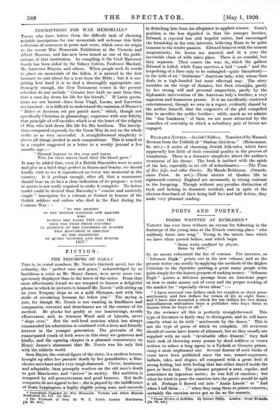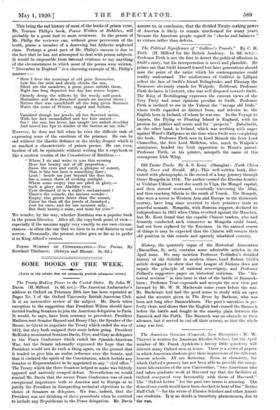POETS AND POETRY.,
POEMS WRITTEN AT RUFILEBEN.*
Norionv has ever been without an excuse for following in the footsteps of the young man at the French watering-place "who suddenly burst into song." Young in the satiric lines which we have often quoted before, and which begin
"Some write confined by physic, Some by debt,"
by no means exhausted the list of reasons. For instance, as Solomon Eagle" points out in his new volume, and as the present writer can testify by applying the methods of the Higher Criticism to the Spectator postbag, a great many people write quite simply for the honest purpose of making money. "Solomon Eagle" quotes a delicious passage from an American paper on how to make money out of verse and the proper working of the market for "especially clever ideas" :—
"I have received two dollars each for couplets or short prose sentiments, and five dollars for verses of six or eight lines ; and I have also accepted a check for ten dollars for two dozen miscellaneous sentiments from a publisher who buys them in dozens when he buys at all."
To the reviewer all this is perfectly straightforward. This type of literature is fairly easy to distinguish, and he will know exactly what to do with "sentiments by the dozen." This is not the type of poem of which we complain. All reviewers should of course have hearts of adamant, but as they usually are supplied with no such invaluable office fitment," they find their task of throwing away poems by dead soldiers or verses written to solace a long agony in a Turkish or German prison- camp a most unpleasant one. Several dozens of such books of verse have been published since the war, sonnet-sequences,
ballads, odes, and elegies, all composed with a great deal of strong feeling, but with feeling that has either stayed inside the poet or been lost. The prisoner prepared a neat, regular, and
sometimes an ingenious metre ; he was full of emotion ; but when he tried to pour the emotion into the poetic mould he spilt it all. Perhaps it flowed out into "Annie Laurie " or "And when I tell them. . ." when they sung them at prison concerts; certainly the emotion never got as far as the sonnets.
• Poems Written at Madden. Ily'rerence Philip. London: Grant Rkbarek
L3s. net.] -
This being the sad history of most of the books of prison verse,
Mr. Terence Philip's book, Poems Written at Rithleben, will probably be a great find to most reviewers. In the person of Mr. Philip the reviewer can, without gross perversion of the truth, praise a member of a deserving but hitherto neglected class. Perhaps a great part of Mr. Philip's success is due to the fact that he has not attempted to deal with prison subjects. It would be impossible from internal evidence to say anything of the circumstances in which most of the poems were written. "November in England" is a charming example of Mr. Philip's manner :— "How I love the mornings of old grim November, Low lies the mist and slowly climbs the sun Silent are the meadows, a great peace enfolds them, Night has long departed but day has scarce begun.
Ghostly droop the willows by the weedy mill-pond, Motionless and dew-drenched stands an ancient thorn ; Nature that was spendthrift all the long green Summer Waits the arms of Winter, ragged and forlorn.
• •
Vanished though her jewels, all her flowered satins, With her feet unsandalled and her hair untied— See ! the sun, her lover, has caught her naked shoulder And kissed her lips to scarlet of the berries at my side."
However, he does not fail when he tries the difficult task of expressing some of the emotions of the prisoner. He can be sad without the chaotic defiance or the sticky despair which is so marked a characteristic of prison poems. He can even, hardest of all, be optimistic without writing like a copybook or like a modern version of the Consolations of Boethius :—
"Where I sit and write to you this evening Here lies beauty out of all proportion ; Raise the eyes and catch a glimpse of sunset, That is fine but here is something finer ; Look ! beside me just beyond the dust-bin, See a corner there of evening sunlight Where some empty tins are piled in glory,— Such a glory not Aladdin even Ever dreamed of in a night's enchantment ! There's the miracle, the ancient wonder : Empty tins grown fairer than the sunset, Fairer far than all the jewels of Jamehyd ; Just for once, and for one moment only, But their beauty's mine, and mine for ever."
We wonder, by the way, whether Boethius was a popular book in the prison 'libraries. After all, the copybook point of view— especially if the maxims apply very exactly to our own circum- stances—is often the one that we turn to in real distress or real sorrow. Personally, the present writer goes so far as to prefer it in King Alfred's version.



































 Previous page
Previous page